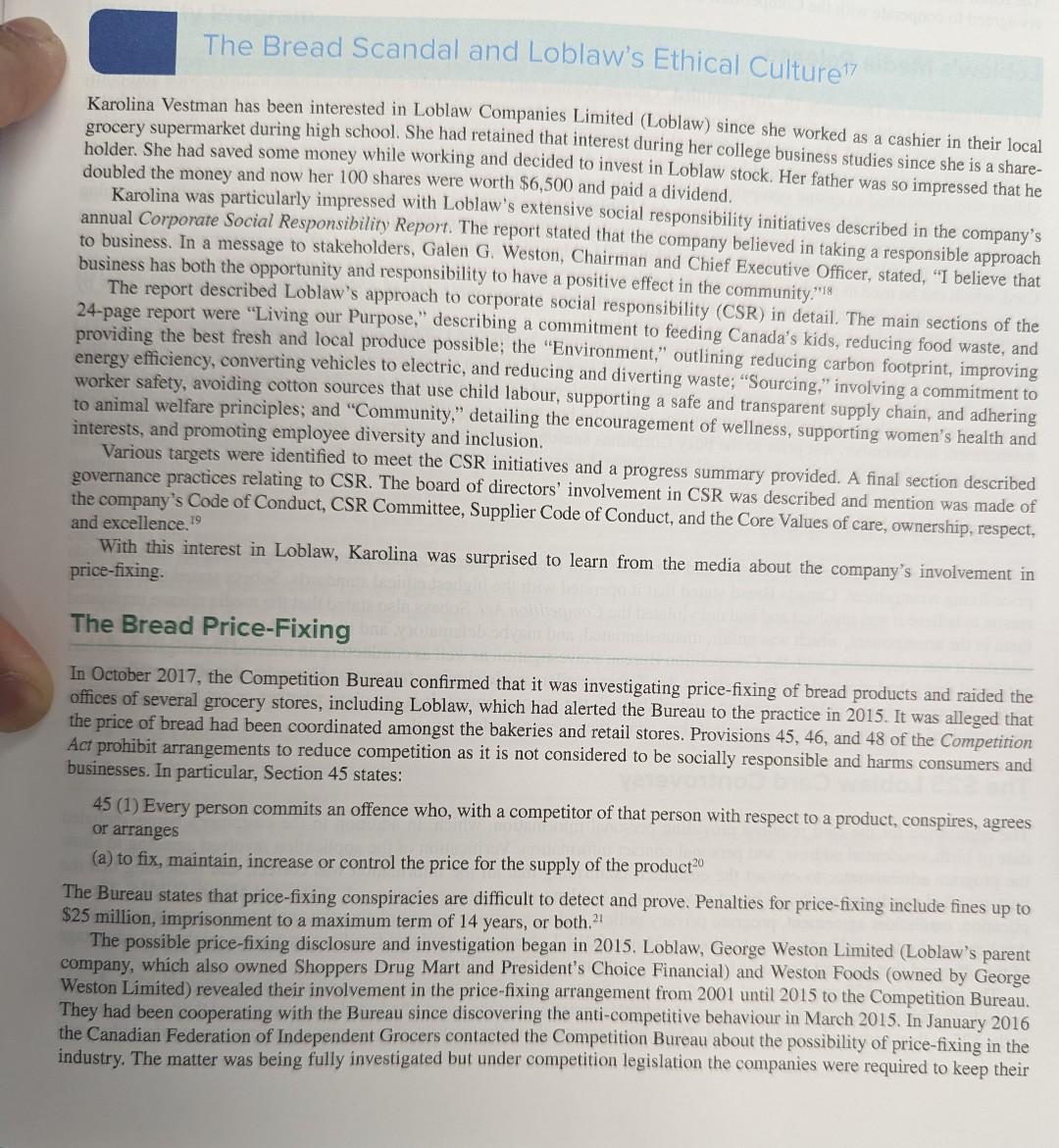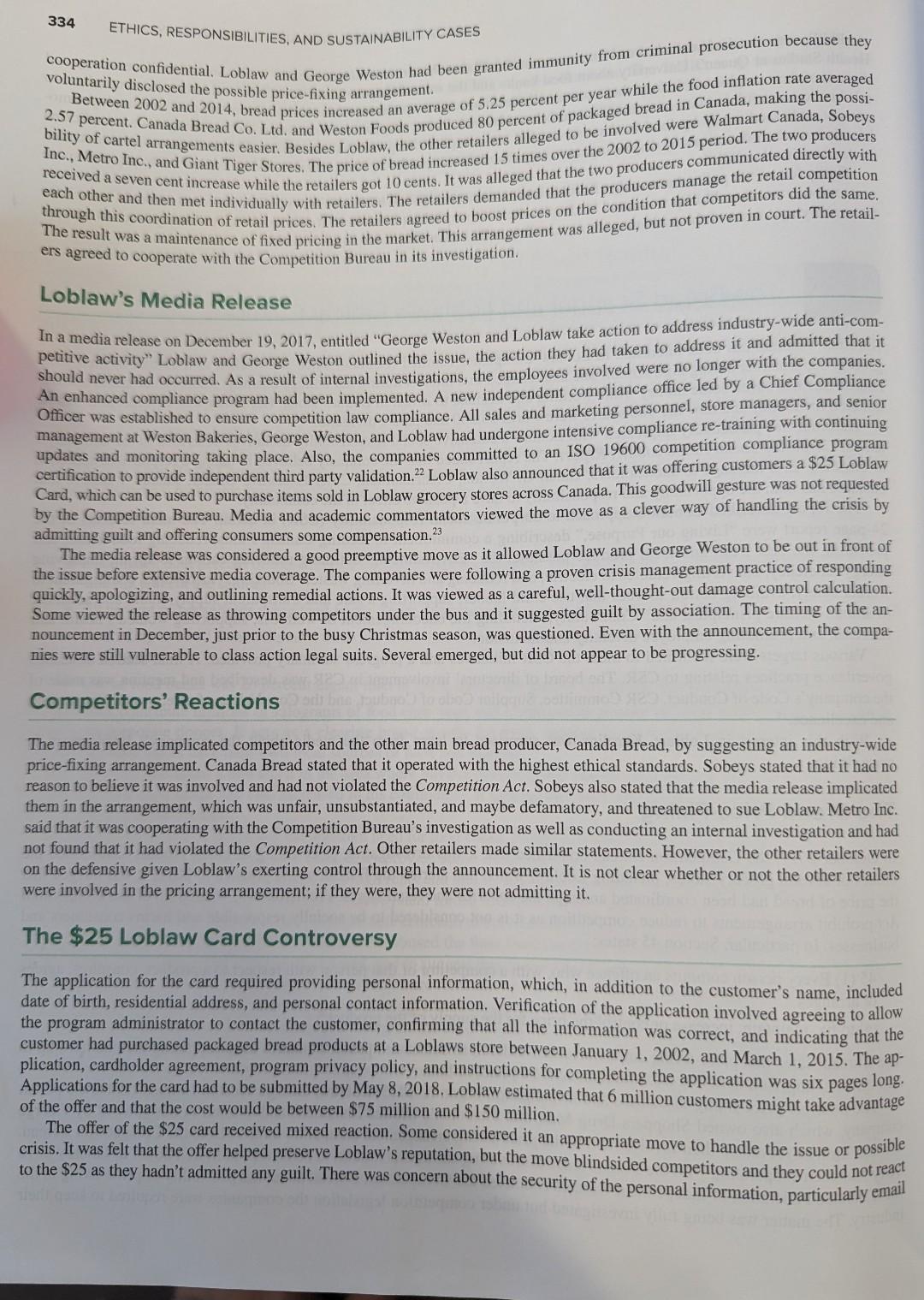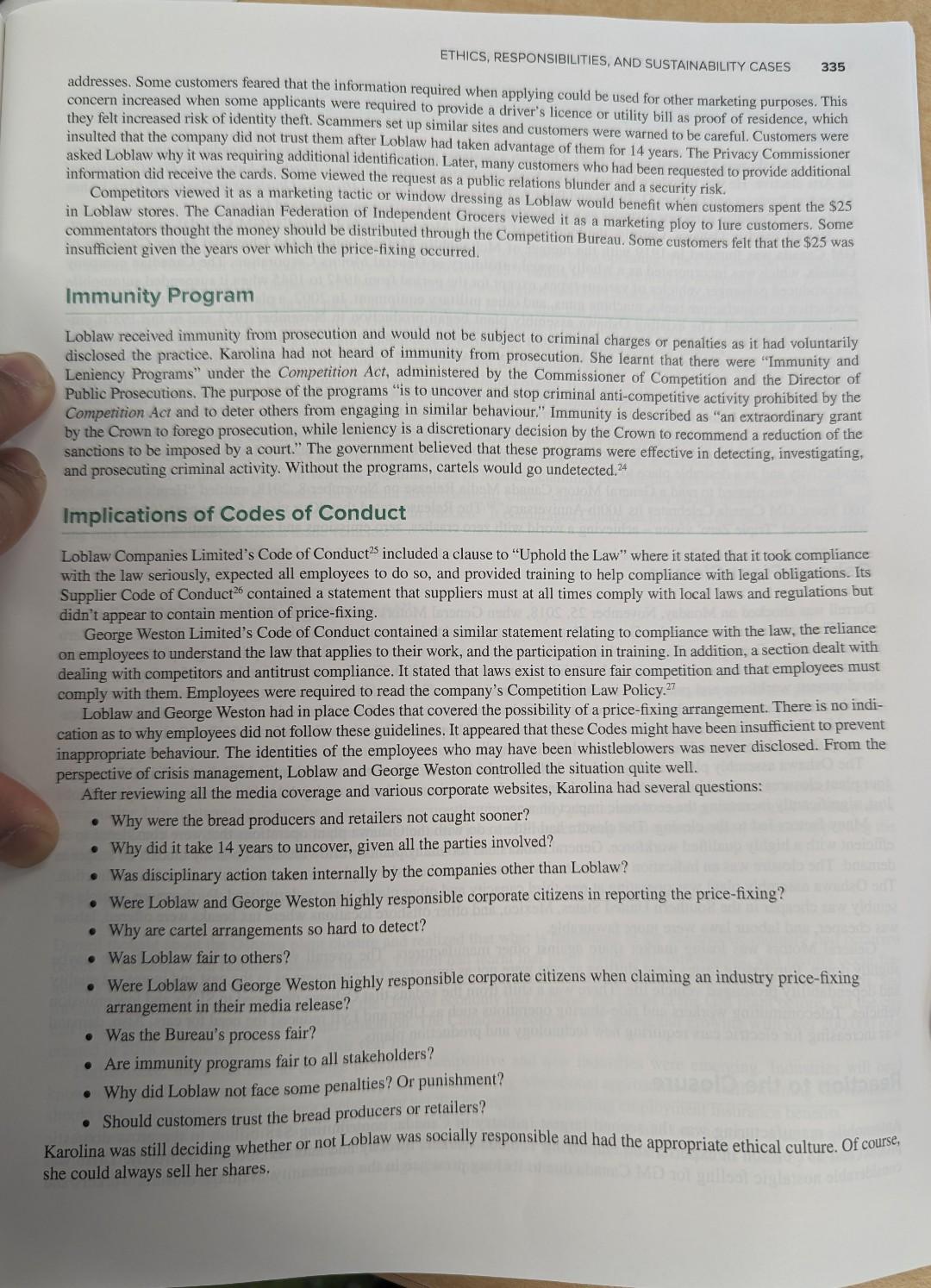Answered step by step
Verified Expert Solution
Question
1 Approved Answer
The Bread Scandal and Loblaw's Ethical Culture 17 Karolina Vestman has been interested in Loblaw Companies Limited (Loblaw) since she worked as a cashier in



The Bread Scandal and Loblaw's Ethical Culture 17 Karolina Vestman has been interested in Loblaw Companies Limited (Loblaw) since she worked as a cashier in their local grocery supermarket during high school. She had retained that interest during her college business studies since she is a sharedoubled the money and now her 100 shares were worth $6,500 anvest in Loblaw stock. Her father was so impressed that he Karolina was particularly impressed with Loblaw's extensive paid a dividend. annual Corporate Social Responsibility Report. The report stated social responsibility initiatives described in the company's to business. In a message to stakeholders, Galen G. Weston, Chairman company believed in taking a responsible approach business has both the opportunity and responsibility to have a positive effeet in Chief Executive Officer, stated, "I believe that The report described Loblaw's approach to corporate social responect in the community.,18 24-page report were "Living our Purpose," describing a commitment to fility (CSR) in detail. The main sections of the providing the best fresh and local produce possible; the "Environm to feeding Canada's kids, reducing food waste, and energy efficiency, converting vehicles to electric, and reducing and divt," outlining reducing carbon footprint, improving worker safety, avoiding cotton sources that use child labour, supporiverting waste; "Sourcing," involving a commitment to to animal welfare principles; and "Community," detailing the encorting a safe and transparent supply chain, and adhering interests, and promoting employee diversity and inclusion. Various targets were identified to meet the CSR initiatives and a progress summary provided. A final section described governance practices relating to CSR. The board of directors' involvement in CSR was described and mention was made of the company's Code of Conduct, CSR Committee, Supplier Code of Conduct, and the Core Values of care, ownership, respect, and excellence. 19 With this interest in Loblaw, Karolina was surprised to learn from the media about the company's involvement in price-fixing. The Bread Price-Fixing In October 2017, the Competition Bureau confirmed that it was investigating price-fixing of bread products and raided the offices of several grocery stores, including Loblaw, which had alerted the Bureau to the practice in 2015 . It was alleged that the price of bread had been coordinated amongst the bakeries and retail stores. Provisions 45,46 , and 48 of the Competition Act prohibit arrangements to reduce competition as it is not considered to be socially responsible and harms consumers and businesses. In particular, Section 45 states: 45 (1) Every person commits an offence who, with a competitor of that person with respect to a product, conspires, agrees or arranges (a) to fix, maintain, increase or control the price for the supply of the product 20 The Bureau states that price-fixing conspiracies are difficult to detect and prove. Penalties for price-fixing include fines up to $25 million, imprisonment to a maximum term of 14 years, or both. 21 The possible price-fixing disclosure and investigation began in 2015. Loblaw, George Weston Limited (Loblaw's parent company, which also owned Shoppers Drug Mart and President's Choice Financial) and Weston Foods (owned by George Weston Limited) revealed their involvement in the price-fixing arrangement from 2001 until 2015 to the Competition Bureau. They had been cooperating with the Bureau since discovering the anti-competitive behaviour in March 2015. In January 2016 the Canadian Federation of Independent Grocers contacted the Competition Bureau about the possibility of price-fixing in the industry. The matter was being fully investigated but under competition legislation the companies were required to keep their ETHICS, RESPONSIBILITIES, AND SUSTAINABILITY CASES 335 addresses. Some customers feared that the information required when applying could be used for other marketing purposes. This concern increased when some applicants were required to provide a driver's licence or utility bill as proof of residence, which insulted that the risk of identity theft. Scammers set up similar sites and customers were warned to be careful. Customers were asked Loblaw why it was requiring addition after Loblaw had taken advantage of them for 14 years. The Privacy Commissioner information did receive the cards. Some viewentification. Later, many customers who had been requested to provide additional the request as a public relations blunder and a security risk. in Loblaw stores. The Canadian Feding tactic or window dressing as Loblaw would benefit when customers spent the $25 commentators thought the money shoult be Independent Grocers viewed it as a marketing ploy to lure customers. Some insufficient given the years over which the distributed through the Competition Bureau. Some customers felt that the $25 was Immunity Program Loblaw received immunity from prosecution and would not be subject to criminal charges or penalties as it had voluntarily disclosed the practice. Karolina had not heard of immunity from prosecution. She learnt that there were "Immunity and Leniency Programs" under the Competition Act, administered by the Commissioner of Competition and the Director of Public Prosecutions. The purpose of the programs "is to uncover and stop criminal anti-competitive activity prohibited by the Competition Act and to deter others from engaging in similar behaviour." Immunity is described as "an extraordinary grant by the Crown to forego prosecution, while leniency is a discretionary decision by the Crown to recommend a reduction of the sanctions to be imposed by a court." The government believed that these programs were effective in detecting, investigating, and prosecuting criminal activity. Without the programs, cartels would go undetected. 24 Implications of Codes of Conduct Loblaw Companies Limited's Code of Conduct 25 included a clause to "Uphold the Law" where it stated that it took compliance with the law seriously, expected all employees to do so, and provided training to help compliance with legal obligations. Its Supplier Code of Conduct 26 contained a statement that suppliers must at all times comply with local laws and regulations but didn't appear to contain mention of price-fixing. George Weston Limited's Code of Conduct contained a similar statement relating to compliance with the law, the reliance on employees to understand the law that applies to their work, and the participation in training. In addition, a section dealt with dealing with competitors and antitrust compliance. It stated that laws exist to ensure fair competition and that employees must comply with them. Employees were required to read the company's Competition Law Policy..27 Loblaw and George Weston had in place Codes that covered the possibility of a price-fixing arrangement. There is no indication as to why employees did not follow these guidelines. It appeared that these Codes might have been insufficient to prevent inappropriate behaviour. The identities of the employees who may have been whistleblowers was never disclosed. From the perspective of crisis management, Loblaw and George Weston controlled the situation quite well. After reviewing all the media coverage and various corporate websites, Karolina had several questions: - Why were the bread producers and retailers not caught sooner? - Why did it take 14 years to uncover, given all the parties involved? - Was disciplinary action taken internally by the companies other than Loblaw? - Were Loblaw and George Weston highly responsible corporate citizens in reporting the price-fixing? - Why are cartel arrangements so hard to detect? - Was Loblaw fair to others? - Were Loblaw and George Weston highly responsible corporate citizens when claiming an industry price-fixing arrangement in their media release? - Was the Bureau's process fair? - Are immunity programs fair to all stakeholders? - Why did Loblaw not face some penalties? Or punishment? - Should customers trust the bread producers or retailers? Karolina was still deciding whether or not Loblaw was socially responsible and had the appropriate ethical culture. Of course, she could always sell her shares
Step by Step Solution
There are 3 Steps involved in it
Step: 1

Get Instant Access to Expert-Tailored Solutions
See step-by-step solutions with expert insights and AI powered tools for academic success
Step: 2

Step: 3

Ace Your Homework with AI
Get the answers you need in no time with our AI-driven, step-by-step assistance
Get Started


